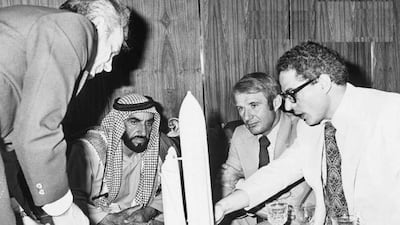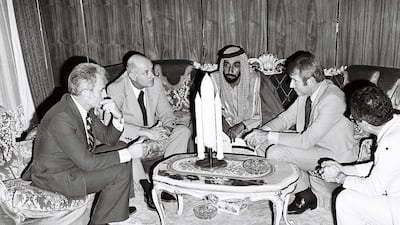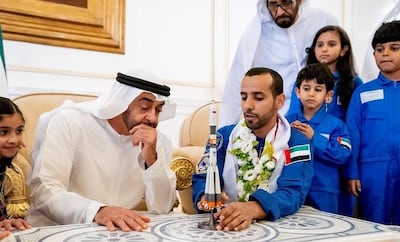A renowned scientist who worked on America’s Apollo programme in the 1960s has described the late Sheikh Zayed’s enthusiasm for space exploration.
Dr Farouk El-Baz said he first met the Founding Father in the UAE in 1974, five years after the US landed the first man on the Moon.
At that time, much of the world was still in thrall to the international space race and Nasa’s extraterrestrial ambitions.
Sheikh Zayed also had a great interest in space, and welcomed the chance to meet Dr El-Baz, who was then part of the American space agency team.
“It was my third time meeting him and I was sent there by Nasa, along with three American astronauts and two Russian cosmonauts,” said Dr El-Baz, describing a photo taken at the time.
“There was a space shuttle that was being designed, and we took it with us to show Sheikh Zayed what we had planned.
“He was fascinated by it and asked a lot of interesting questions. I was very delighted to meet him early in the game.”
Dr El-Baz was speaking during a virtual online discussion held by the Emirates Literature Foundation on Saturday.
The Egyptian American scientist was the lead geologist on the Apollo programme, playing a key role in the Apollo 11 Moon landing mission.
He recalled how on meeting in the UAE, Sheikh Zayed had encouraged him to share his expertise on space exploration with Abu Dhabi school pupils.
A photograph of the men together, along with three Apollo astronauts, would later go on to inspire the Emirate’s first astronaut, Maj Hazza Al Mansouri.
Maj Al Mansouri took a copy of the photo on his mission to the International Space Station last year.
“When I first went there [the UAE] in 1974 to meet him [Sheikh Zayed] about the scientific results of the Apollo mission to the Moon, there were no photographers,” said Dr El-Baz.
“The second time the Apollo 15 astronauts took my photos with him. The third time, the photos in 1976, there was media present.”
In September last year, Maj Al Mansouri became the first Arab astronaut to be sent to the space station.
He spent eight days on board the ISS, where he was involved in performing a series of experiments, before returning to Earth and touching down in Kazakhstan on October 3.
Once back in the UAE, the astronaut recreated the 1976 photo showing the Founding Father that had so inspired him.
This time, the new image included Sheikh Mohamed bin Zayed, Crown Prince of Abu Dhabi and Deputy Supreme Commander of the Armed Forces.
On Saturday, Dr El-Baz spoke of his hopes for the formation of an Arab space agency.
The UAE has created what is known as the Arab Space Co-operation Group, of which 14 nations are part.
Dr Mohammed Al Ahbabi, director-general of the UAE Space Agency, has said that the country’s long-term goal was to form an Arab space agency.
“We have the capabilities, but the only problem is that we have not looked at our young people and pushed them,” Dr El-Baz said.
“The UAE has reached its position of greatness today only because it supported its young people – men and women.”
This week, the Emirates is scheduled to launch its Hope probe to Mars from the Tanegashima Space Centre in Japan.
Dr El-Baz said research obtained from the mission would benefit scientists around the world.
“We are also going to benefit from the data of wind circulation around Mars that this mission is going to be giving us,” he said.
“We will be able to see the relationship between the wind pattern in the upper atmosphere and the one in lower atmosphere, and therefore understand the creation of the sandstorms on Mars.”
Zaki Nusseibeh, a UAE Minister of State, who was also part of the online discussion, described the probe as a “revolutionary moment”.
“This probe has already established a record that is truly astounding – completed within six years,” he said.
“[The UAE] did not go buy a ready-made probe from a supplier, we are now building our own by collaborating with others.”




